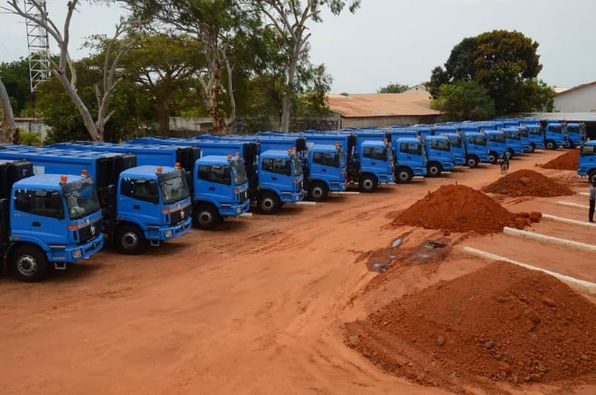Gambiaj.com – (BANJUL, The Gambia) – The Local Government Commission of Inquiry has uncovered intricate financial dealings surrounding the Kanifing Municipal Council’s (KMC) procurement of waste collection trucks, revealing substantial profit margins for Espace Motors and questionable practices in the loan arrangement.
Testifying before the commission, Jim Gaye, Sales and Marketing Manager at Espace Motors, disclosed that while each truck was purchased for $90,000, the company initially invoiced KMC for $121,000 per truck. After negotiations, the price was reduced to $110,000, securing a $20,000 profit per truck for Espace Motors. With 19 trucks in total, the profit amounted to $380,000.
Profit-Sharing and Loan Structure
Gaye explained that Espace Motors and AGIB Bank operated a joint account, sharing profits at a 60-40 split. Despite this partnership, he admitted to having never seen the formal agreement between the two entities. Lead Counsel Patrick Gomez requested the submission of the joint-venture agreement, a request approved by Commission Chairperson Jainaba Bah.
According to Gaye, Espace Motors secured financing for the trucks from AGIB Bank after winning a public tender against competitors like TK Motors and Shyben A. Madi. The financing arrangement required KMC to repay the $122,259,000 loan within 36 months, with monthly payments of $3,000,000. However, Gaye admitted that the repayment plan was based on verbal assurances from KMC rather than documented feasibility studies.
Disputed Loan Responsibility and Bank’s Perspective on Viability
A contentious issue emerged at the hearing over who bore the loan responsibility. Gaye initially claimed the KMC indirectly took the loan, a notion firmly dismissed by Lead Counsel Gomez. “There is nothing like an indirect loan,” Gomez asserted, emphasizing that AGIB Bank provided the funds to Espace Motors.
Testimony revealed that KMC struggled to generate sufficient revenue from the trucks to meet repayment obligations, leading to payments being deducted from the council’s main account.
Samba Faye, a former relationship manager at AGIB Bank, corroborated the financial strain on KMC. Faye testified that the bank initially declined the loan proposal, deeming it unviable. However, AGIB ultimately disbursed funds through its partnership account with Espace Motors.
“The bank knew that the transaction was financially suicidal,” Gomez remarked, with Faye agreeing that the arrangement was exorbitant and unsustainable. Faye also revealed that the trucks, sourced from Photon Company in Beijing, China, were purchased through Espace Motors, which served as Photon’s agent. Despite this, AGIB pursued KMC for repayment instead of Espace Motors.
Corporate Responsibility or Oversight?
Gaye defended Espace Motors’ involvement, claiming the company supported KMC as part of its corporate social responsibility. However, Counsel Gomez dismissed this assertion, stating, “Do not play with the emotions of the people by saying you were doing corporate social responsibility.”
Gaye admitted that the trucks were not insured as stipulated by the agreement, and no feasibility studies were conducted to assess the project’s viability.
The inquiry continues to scrutinize the financial and legal aspects of the tripartite agreement involving KMC, AGIB Bank, and Espace Motors. The commission has directed the submission of additional documentation, including the partnership agreements and correspondence with Photon Company.
This unfolding case highlights systemic lapses in procurement processes and financial accountability, with significant implications for public trust in municipal governance.










